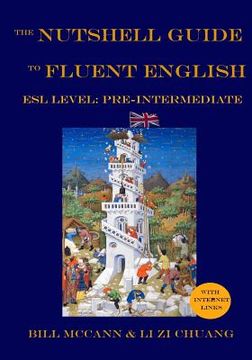Compartir
The Nutshell Guide to Fluent English: Volume 1: ESL Pre-Intermediate (en Inglés)
Bill McCann
(Autor)
·
Createspace Independent Publishing Platform
· Tapa Blanda
The Nutshell Guide to Fluent English: Volume 1: ESL Pre-Intermediate (en Inglés) - Chuang, Li Zi ; McCann, Bill
$ 19.29
$ 38.58
Ahorras: $ 19.29
Elige la lista en la que quieres agregar tu producto o crea una nueva lista
✓ Producto agregado correctamente a la lista de deseos.
Ir a Mis Listas
Origen: Estados Unidos
(Costos de importación incluídos en el precio)
Se enviará desde nuestra bodega entre el
Lunes 05 de Agosto y el
Lunes 19 de Agosto.
Lo recibirás en cualquier lugar de Ecuador entre 1 y 3 días hábiles luego del envío.
Reseña del libro "The Nutshell Guide to Fluent English: Volume 1: ESL Pre-Intermediate (en Inglés)"
This book is part of a series which aims to help English Language Learners to become fluent in Spoken English. It is the first in a planned series of three and caters for those Learners who are ready to move up to the ESL (English as a Second Language) Pre-Intermediate level in Spoken English. We begin here because, in terms of the spoken language, the leap from the Elementary to the Pre-Intermediate level is one of the biggest hurdles faced by English Language Learners. It is one of the greatest hurdles because it is at this stage that the Learner must move from simple spoken forms to a degree of fluency that begins to use more complex forms of the language. It is the first major hurdle that very many Learners cannot get over. As a result, it is at this point that a Learner can become stuck and either give up trying to become fluent in Spoken English or fail to make any real progress in comparison to their writing and reading skills. There are two main reasons why this happens. The first is that native English speakers do not speak the language in the same way that they write it. The spoken word very often bears little or no resemblance to the written word. The second is that a Spoken language must be learnt - it cannot be taught. By this we mean that, while all learning is a two-way process between the instructor and the learner, when it comes to learning to speak a language, something more than 80% of the work must be done by the Learner on their own. One of the obvious areas where this is true is in the need to learn vocabulary. To become fluent in a spoken language, a great many new words must be learnt - and only the Learner can do that. The instructor cannot learn them for him. How that vocabulary is learnt is a large issue. By far, the vast majority of Learners try to do this by memorising list of English words and their equivalent meanings in their native language. This does not. In this book you will discover a new way to learn the vocabulary that you need, and how to make it fun to learn. The emphasis in this book is on practical use of the language. In each Unit, Learners are given the opportunity to extend their vocabulary and to practice speaking the language of the native speakers. We have called this Idiomatic Spoken English, or everyday English. All of the examples and dialogues in this book use this language. It is not slang (or street language) but a language that uses all the shortcuts and tricks that native speakers use to keep a fluent and rhythmic flow of words when they speak. Successfully reproducing the rhythm of English (Enunciation) is one of the main secrets of being able to speak the language fluently. In this book we describe how that rhythm is actually built up and use the work of some of the great English poets to help the Learner to get a feel for the very beautiful cadences that English is capable of. Each Unit includes a full poem (or occasionally an extract from a very long poem) with notes about the rhythm (metre) of the poem together with its meaning and background. Of no less importance than Enunciation is Pronunciation. All Learners, no matter what their native language might be, have some difficulty in pronouncing English correctly. For this reason, great emphasis is placed on the Sounds of English, and each Unit includes examples and rigorous exercises for two of the 44 sounds that make up the English language. The first three Units of the book set out the essential foundations of The Nutshell Way to learn to speak English fluently. Some of the six basic principles (introduced in Unit One) on which this is based may well surprise many Learners (and not a few Instructors). But our experiences as Instructor and Learner have shown us that this radical approach is not only workable but absolutely necessary if A Learner is to clear the hurdle and Learn to speak fluent English with confidence.
- 0% (0)
- 0% (0)
- 0% (0)
- 0% (0)
- 0% (0)
Todos los libros de nuestro catálogo son Originales.
El libro está escrito en Inglés.
La encuadernación de esta edición es Tapa Blanda.
✓ Producto agregado correctamente al carro, Ir a Pagar.

